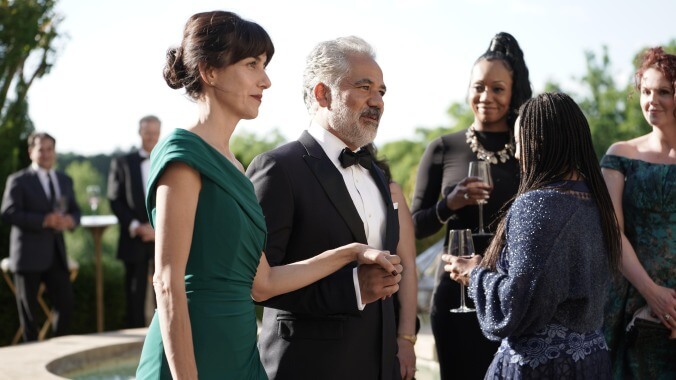It’s a bit of storytelling that becomes less apt and more cliched with each passing year: According to Pew, two-thirds of Latinx people in the U.S. are born here and of the one-third who immigrated, most are documented. But, as its title suggests, Promised Land is steeped in the kind of American exceptionalism that comforts many Anglos and Latinxs alike—that immigrants are better off here; that despite punitive laws and rampant discrimination, on balance, the U.S. is better than the homelands they’ve left. The show contrasts these recent, young immigrants’ experiences which the multigenerational Sandoval family, owners of one of the largest wineries in California, the fictional Heritage House. The whole family lives a life of luxury—we’re talking beautiful houses, cars, and outfits.
The juxtaposition isn’t just about money and age, but rather happiness and the moral grounding it requires. Among the Sandovals, there’s a hint of Succession, with the politics between the heirs promising to stir up drama, although the Sandovals know more about what it means to actually work than the Roys. They create a tangible product, after all, and are surrounded by farmworkers, with the older generation having labored in the fields themselves. So when step-son Mateo Flores (Augusto Aguilera) tells patriarch Joe Sandoval (John Ortiz), “You climb up the latter and then pull it up behind you,” it stings. Perhaps the Sandovals are not aspirational pillars of Latinx society—perhaps they “succeeded” where so many fail by de-prioritizing the community and their family, and now they’re going to pay for it.
Then again, maybe not. This is a Dallas-style soap (a source of inspiration for showrunner and EP Matt Lopez) and it takes time to set up all the tensions, plot-lines, and intrigue to make a show like that work. By the second episode, Promised Land hits its stride, undercutting many of the cliches it sets up in the pilot. Take Lettie, Joe’s wife, who is played by House Of Flowers’ Cecilia Suárez. She’s deeply underutilized in the first episode, celebrating her anniversary by looking pretty, saying things no one listens to, and not much else.
But as Promised Land goes on, we see there’s more to Lettie; her backstory breaks her out of the traditional TV wife mold, which is often either dutiful or conniving. She was around when Joe met his first wife (Bellamy Young, in the antagonist role) and her first marriage was to Joe’s brother. Lettie’s divided interests and unusual history make her a dynamic character, someone who’s more human than a “type,” who has the ability to surprise.
If that pattern continues, Promised Land is poised to be just as subversive as it is soapy. At least two of the five Sandoval children are part of the LGTBQ+ community, but their respective identities have distinct effects on their relationships with their father. With more time, the show can further tease out those nuances, reminding viewers that there’s no singular experience: Latinx, gay, or otherwise. Likewise, Promised Land looks to deftly address race, a topic hotly debated both within and outside the Latinx community. The Sandovals are pretty light-skinned, with only the men sporting a greater variation of pigmentation. That’s why their new maid Daniela (Natalia del Riego) stands out: She has dark skin and Indigenous features, and the show refuses to ignore her, freeing her from the constraints of the typical (a.k.a. silent, victimized) domestic in short order.
Actor John Ortiz told Deadline it took him 30 years to lead a TV show, which demonstrates how often Latinx performers have to jump through extra hoops. Promised Land feels just as long-awaited, the rare network series with a Latinx showrunner, mostly Latinx cast, and Latinx-centered story. The show can still go in any direction, but in these first 80 minutes, Promised Land lays the groundwork for a nuanced look into what it means to be an immigrant, Latinx, and self-made in the U.S. today.













![HBO teases new Euphoria, Larry David, and much more in 2026 sizzle reel [Updated]](https://img.pastemagazine.com/wp-content/avuploads/2025/12/12100344/MixCollage-12-Dec-2025-09-56-AM-9137.jpg)




























